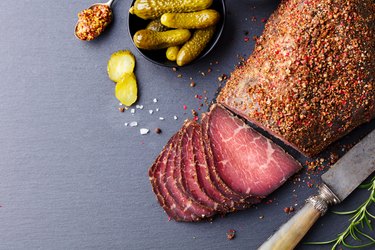
Smoking is one of the oldest methods of preserving meat products. There are many different smoking techniques, including rapid hot smoking, slow hot smoking and cold smoking. Unfortunately, most smoked meats are unhealthy, although healthy smoked meats can be produced using a zeolite filter.
Tip
Smoked meat is a well-known preservation method that can help prevent microbial contamination. However, most smoking methods also involve carcinogens, which are bad for your overall health.
Video of the Day
Video of the Day
Different Types of Smoked Meats
According to an article in the Journal of Sensory Studies that was published in June 2017, smoking is one of the oldest known methods of preserving foods, particularly proteins like fish and meat. Smoking can be accomplished in a variety of ways.
You can smoke meat or fish through the use of a barbecue, wood smoker, electric smoker or any other type of smoker. The type of smoker you'd require depends on whether you'd like to rapidly or slowly smoke your meat. You can also cold-smoke meat, though this requires a different process and requires you to salt-cure it or ferment it first.
It's also possible to use liquid smoke for meat and fish. A January 2014 study in the Journal of the International Conference on Food Security and Nutrition reported that liquid smoke can be added to prevent microbial growth of pathogenic bacteria like Escherichia coli and Staphylococcus aureus, which are known to cause food-borne diseases.
Alternatively, smoking can be added as a form of flavoring. However, in such cases, the smoke is essentially added to your meat like an herb or spice and won't have any of the same preservation or antimicrobial benefits.
Unhealthy vs. Healthy Smoked Meats
Most smoked meats have cancer and related conditions associated with them. According to a June 2017 study in the Journal of the National Cancer Institute and an August 2013 study in the Journal of Food Chemistry, smoked meats are a known source of carcinogens called polycyclic aromatic hydrocarbons. These carcinogens are not only considered to influence the risk of cancer but mortality rates following cancer, as well.
Cooking methods involving high heat, like grilling, barbecuing, pan-frying and frying, also produce carcinogens like these. Meat that is exposed to smoke is also likely to contain these carcinogens — which means most smoking techniques are also likely to contain carcinogenic byproducts too.
However, according to the study in the Journal of Food Chemistry, the type and number of carcinogens in your smoked meat depend on exactly how it was smoked. For example, the use of certain woods, like poplar and hickory, can produce less carcinogens than beech wood.
Although these meats aren't exactly healthy smoked meats, they are less carcinogenic than smoked meats produced through beech-wood smoking. The same study also found that certain carcinogens were higher in cold-smoked meats, while other types of carcinogens were higher in hot-smoked meats.
Thus far, the only reliable way to reduce the carcinogen content in smoked meats has been through the use of a zeolite filter for the smokers you cook the meat in. Zeolite filters, which are typically used in the car industry to reduce exposure to pollutants, have been found to reduce the carcinogens in smoked meats while simultaneously increasing their flavor.
Unfortunately, this research is fairly recent. This means that all smoked meats you purchase at the supermarket or eat at a restaurant are all likely to contain carcinogens — it's simply a matter of how much. However, this research does mean that in the near future, healthy smoked meats may be created using zeolite filtration techniques.
- American Chemical Society: "Smoked Foods Are Tastier, Less Harmful With a Tip From the Auto Industry"
- Journal of the National Cancer Institute: "Grilled, Barbecued, and Smoked Meat Intake and Survival Following Breast Cancer"
- Food Chemistry: "Polycyclic Aromatic Hydrocarbons (PAH) and Phenolic Substances in Meat Products Smoked With Different Types of Wood and Smoking Spices"
- National Cancer Institute: "Chemicals in Meat Cooked at High Temperatures and Cancer Risk"
- Journal of the International Conference on Food Security and Nutrition: "Antimicrobial Activity of Corncob Liquid Smoke and Its Aplication to Smoked Milkfish (Chanos chanos Forsk) Using Electric and Mechanical Oven"
- Journal of Sensory Studies: "Determination of a Lexicon for the Sensory Flavor Attributes of Smoked Food Products"